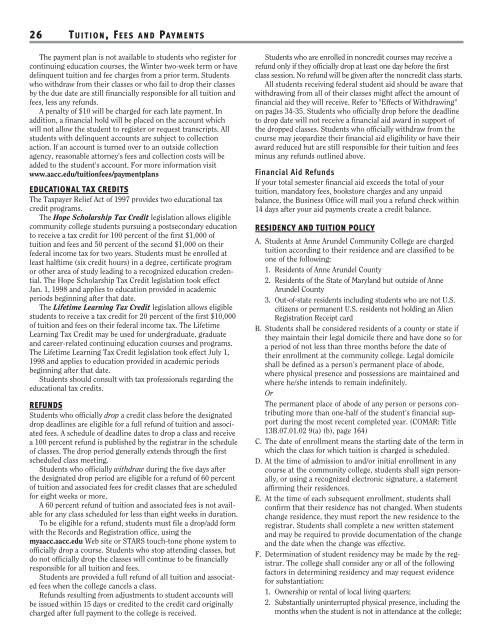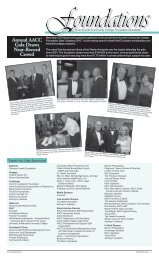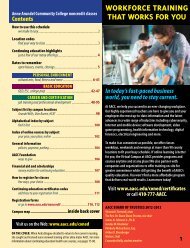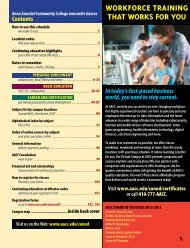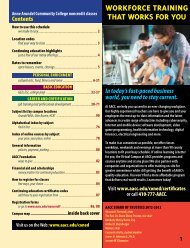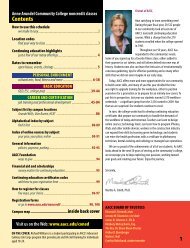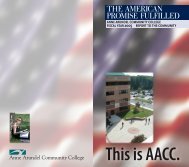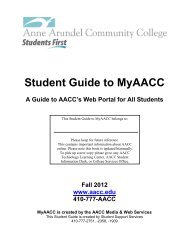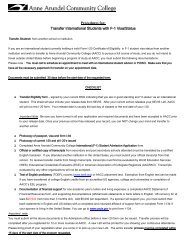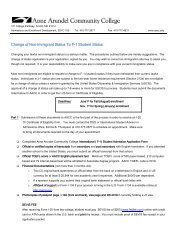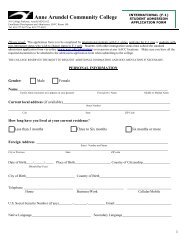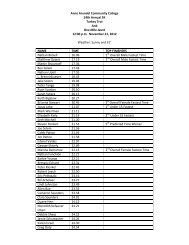101 College Parkway Arnold, Maryland 21012-1895 Internet ...
101 College Parkway Arnold, Maryland 21012-1895 Internet ...
101 College Parkway Arnold, Maryland 21012-1895 Internet ...
Create successful ePaper yourself
Turn your PDF publications into a flip-book with our unique Google optimized e-Paper software.
26 T U I T I O N, F E E S A N D PAYM E N T S<br />
The payment plan is not available to students who register for<br />
continuing education courses, the Winter two-week term or have<br />
delinquent tuition and fee charges from a prior term. Students<br />
who withdraw from their classes or who fail to drop their classes<br />
by the due date are still financially responsible for all tuition and<br />
fees, less any refunds.<br />
A penalty of $10 will be charged for each late payment. In<br />
addition, a financial hold will be placed on the account which<br />
will not allow the student to register or request transcripts. All<br />
students with delinquent accounts are subject to collection<br />
action. If an account is turned over to an outside collection<br />
agency, reasonable attorney's fees and collection costs will be<br />
added to the student's account. For more information visit<br />
www.aacc.edu/tuitionfees/paymentplans<br />
EDUCATIONAL TAX CREDITS<br />
The Taxpayer Relief Act of 1997 provides two educational tax<br />
credit programs.<br />
The Hope Scholarship Tax Credit legislation allows eligible<br />
community college students pursuing a postsecondary education<br />
to receive a tax credit for 100 percent of the first $1,000 of<br />
tuition and fees and 50 percent of the second $1,000 on their<br />
federal income tax for two years. Students must be enrolled at<br />
least halftime (six credit hours) in a degree, certificate program<br />
or other area of study leading to a recognized education credential.<br />
The Hope Scholarship Tax Credit legislation took effect<br />
Jan. 1, 1998 and applies to education provided in academic<br />
periods beginning after that date.<br />
The Lifetime Learning Tax Credit legislation allows eligible<br />
students to receive a tax credit for 20 percent of the first $10,000<br />
of tuition and fees on their federal income tax. The Lifetime<br />
Learning Tax Credit may be used for undergraduate, graduate<br />
and career-related continuing education courses and programs.<br />
The Lifetime Learning Tax Credit legislation took effect July 1,<br />
1998 and applies to education provided in academic periods<br />
beginning after that date.<br />
Students should consult with tax professionals regarding the<br />
educational tax credits.<br />
REFUNDS<br />
Students who officially drop a credit class before the designated<br />
drop deadlines are eligible for a full refund of tuition and associated<br />
fees. A schedule of deadline dates to drop a class and receive<br />
a 100 percent refund is published by the registrar in the schedule<br />
of classes. The drop period generally extends through the first<br />
scheduled class meeting.<br />
Students who officially withdraw during the five days after<br />
the designated drop period are eligible for a refund of 60 percent<br />
of tuition and associated fees for credit classes that are scheduled<br />
for eight weeks or more.<br />
A 60 percent refund of tuition and associated fees is not available<br />
for any class scheduled for less than eight weeks in duration.<br />
To be eligible for a refund, students must file a drop/add form<br />
with the Records and Registration office, using the<br />
myaacc.aacc.edu Web site or STARS touch-tone phone system to<br />
officially drop a course. Students who stop attending classes, but<br />
do not officially drop the classes will continue to be financially<br />
responsible for all tuition and fees.<br />
Students are provided a full refund of all tuition and associated<br />
fees when the college cancels a class.<br />
Refunds resulting from adjustments to student accounts will<br />
be issued within 15 days or credited to the credit card originally<br />
charged after full payment to the college is received.<br />
Students who are enrolled in noncredit courses may receive a<br />
refund only if they officially drop at least one day before the first<br />
class session. No refund will be given after the noncredit class starts.<br />
All students receiving federal student aid should be aware that<br />
withdrawing from all of their classes might affect the amount of<br />
financial aid they will receive. Refer to "Effects of Withdrawing"<br />
on pages 34-35. Students who officially drop before the deadline<br />
to drop date will not receive a financial aid award in support of<br />
the dropped classes. Students who officially withdraw from the<br />
course may jeopardize their financial aid eligibility or have their<br />
award reduced but are still responsible for their tuition and fees<br />
minus any refunds outlined above.<br />
Financial Aid Refunds<br />
If your total semester financial aid exceeds the total of your<br />
tuition, mandatory fees, bookstore charges and any unpaid<br />
balance, the Business Office will mail you a refund check within<br />
14 days after your aid payments create a credit balance.<br />
RESIDENCY AND TUITION POLICY<br />
A. Students at Anne Arundel Community <strong>College</strong> are charged<br />
tuition according to their residence and are classified to be<br />
one of the following:<br />
1. Residents of Anne Arundel County<br />
2. Residents of the State of <strong>Maryland</strong> but outside of Anne<br />
Arundel County<br />
3. Out-of-state residents including students who are not U.S.<br />
citizens or permanent U.S. residents not holding an Alien<br />
Registration Receipt card<br />
B. Students shall be considered residents of a county or state if<br />
they maintain their legal domicile there and have done so for<br />
a period of not less than three months before the date of<br />
their enrollment at the community college. Legal domicile<br />
shall be defined as a person’s permanent place of abode,<br />
where physical presence and possessions are maintained and<br />
where he/she intends to remain indefinitely.<br />
Or<br />
The permanent place of abode of any person or persons contributing<br />
more than one-half of the student’s financial support<br />
during the most recent completed year. (COMAR: Title<br />
13B.07.01.02 9(a) (b), page 164)<br />
C. The date of enrollment means the starting date of the term in<br />
which the class for which tuition is charged is scheduled.<br />
D. At the time of admission to and/or initial enrollment in any<br />
course at the community college, students shall sign personally,<br />
or using a recognized electronic signature, a statement<br />
affirming their residences.<br />
E. At the time of each subsequent enrollment, students shall<br />
confirm that their residence has not changed. When students<br />
change residence, they must report the new residence to the<br />
registrar. Students shall complete a new written statement<br />
and may be required to provide documentation of the change<br />
and the date when the change was effective.<br />
F. Determination of student residency may be made by the registrar.<br />
The college shall consider any or all of the following<br />
factors in determining residency and may request evidence<br />
for substantiation:<br />
1. Ownership or rental of local living quarters;<br />
2. Substantially uninterrupted physical presence, including the<br />
months when the student is not in attendance at the college;


